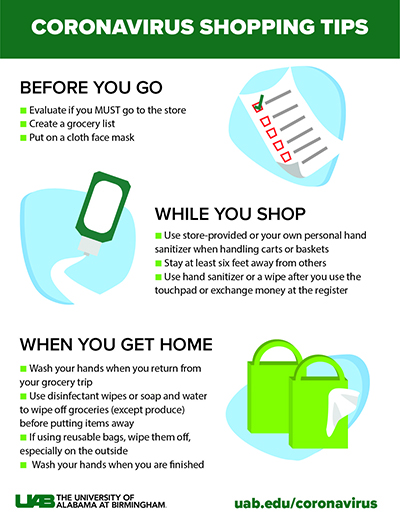BIRMINGHAM, Ala. – The novel coronavirus has changed many aspects of our day-to-day lives, including trips to the grocery store. Instead of popping by the supermarket to grab what you need for tonight’s dinner, many are now second-guessing their trips and wondering whether it is even safe to go into a store and be exposed, not only to other people, but also to items that may have been touched by several others.
Mirjam-Colette Kempf, Ph.D., MPH, an infectious diseases expert and a professor at the University of Alabama at Birmingham School of Nursing, explains what to do to protect yourself from the novel coronavirus before, during and after your trip to the store.
Before you go to the store
The most important thing to do before you go to the store is evaluate whether you even have to make the trip.
“You should go to the store only for essential items that you cannot live without in the moment,” Kempf said.
If you are considered high-risk due to your age or if you are immunocompromised, Kempf recommends having your groceries delivered or asking a family member or neighbor to pick up your groceries for you on their next trip to the store.
If those options are not available but you still need to buy groceries, try going during special hours set aside for senior citizens and those who are immunocompromised.
For people who are not high-risk but still need to buy groceries, making a list beforehand is an important step.
“You should try to minimize your time in a grocery store. One way to do this is to make a list so you know what you want. This will reduce the time that you are walking around looking for various items.”
Kempf adds that you should plan to buy the groceries you need for the next two weeks to limit the number of trips you make to the store.
Protect yourself and others while grocery shopping
Once you arrive at the store, grab a wipe, if it is available, or use your own to wipe down the cart or basket, especially around the handles.
Some stores are allowing only a certain number of people inside at a time; but even if your store is not doing this, it is important to practice physical distancing from other customers.
“Be patient, and give others their space. If someone else is in front of the product you want, wait for them to leave, and make sure you are staying 6 feet away from others.”
Grocery Shopping in the Time of COVID-19
|
When checking out, put your credit card or money in a pocket or somewhere that is easily accessible so that you do not have to search in your purse and touch other items.
If you have to use a touchpad or pen or accept change, use hand sanitizer or a wipe to clean your hands after putting those items away.
As for reusable bags, Kempf says it is safe to keep using them, as long as you wipe the bags down, especially on the outside, after each use.
Once you get home from the store
When you get home from the store, the first step is to wash your hands after you bring your groceries in, but before you unpack them.
Kempf recommends setting up a sanitation station somewhere in your house, where you can wipe down the groceries with anti-bacterial wipes. It is important to do this before you put your groceries away.
“After you’ve washed your hands, wiped off your groceries and put them away, wash your hands again,” Kempf added.
If you wore a facemask to the store, make sure to wash your hands after taking it off, and do not touch your face until you have clean hands.
For produce, you should continue to wash items before you eat, as you would do on a regular basis. Kempf says you do not need to wash your produce before you put it in the refrigerator.
For more information about protecting yourself and your family from the novel coronavirus, visit UAB’s coronavirus website.






























